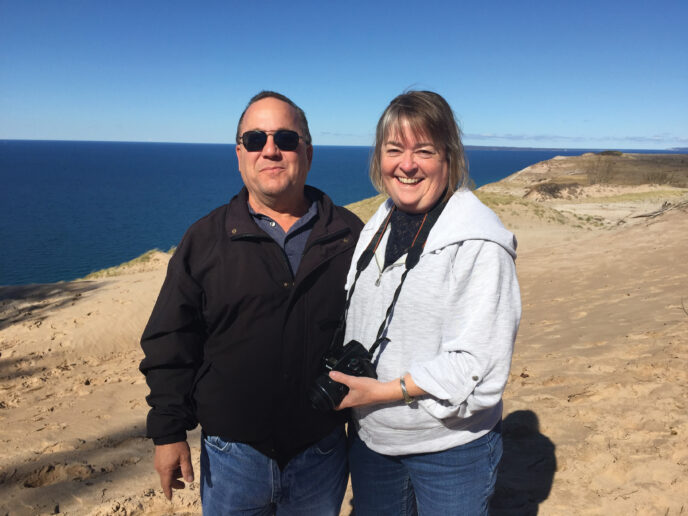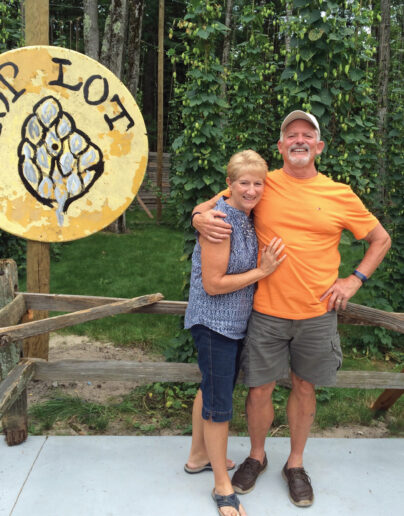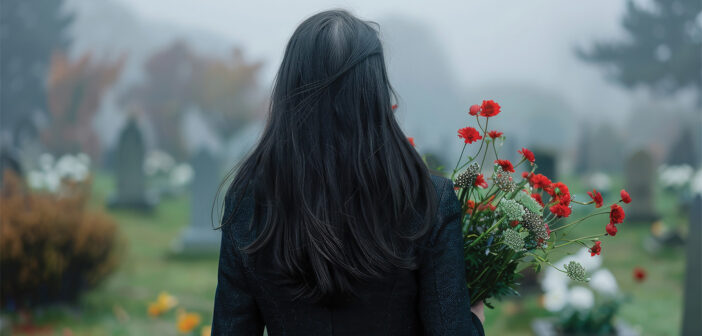In a couple’s life together, their wedding is typically one of the most joyous occasions. The day is filled with sheer happiness and excitement, celebrating with friends and family, and the promise of building a life of countless, wonderful years together. So happy are they that the few short words of their marriage vows, “‘til death do us part” are spoken, but very quickly overlooked and forgotten – that is, until that parting actually happens.
When it does, there is at first so much to do, not the least of which is arranging and enduring a funeral, taking care of financial and other business matters as a bereft person, followed by the overwhelming task of distributing or disposing of their loved one’s personal belongings.
Once that is accomplished, the question is “Now what?’ Moving on without a life partner has its challenges, but there is no choice. It must be done.
In early April 2019, Fenton City Councilman Scott Grossmeyer lost his 63-year-old wife Ruth after a brief battle with cancer. They were married for nearly 35 years.

Scott and Ruth Grossmeyer
“There is no one ‘hardest part’ about losing her,” he said. “I was pretty much numb for the first couple of months. Everything about daily life changed. I had a partner for everything from chores to vacations and now, I don’t have her to share life with. Our retirement together changed from having my partner to share things with to doing things alone. Even happy occasions like the birth of my grandson are a little sad, because I know how much she wanted to be a grandmother.”
Grossmeyer said being with his daughter, son-in-law and ten-month-old grandson helps, and he plans to spend more time with them, ‘It also helps when I look around and realize how many people I know who also have lost a spouse,” he said.
Grossmeyer recalls vividly the day he buried his wife’s cremains, six months after her passing.
“That day, after the luncheon I volunteered at a local fundraising event,” he said. ‘I remember looking around the tent and seeing probably a dozen people I knew who had all lost a spouse. That helped to comfort me and still does. It’s a large club that none of us wanted to join.
“I live in an amazing community full of loving people, and a wonderful neighborhood with great neighbors that I am close with and that helps,” Grossmeyer added. “Whenever I don’t want to be alone, I can go into most any store or restaurant and have a conversation and maybe even get an occasional hug. I really miss hugs. If I don’t want to eat alone, there are a couple of restaurants where I know that someone will join me after I sit down and engage in conversation.” Grossmeyer is also very involved in the community through both government and volunteering. “Being involved, I have met a lot of people who I have come to love and respect, and they are a great support system. For me, being out of the house and engaged with other people helps.”
Grossmeyer said he has learned that everyone grieves differently, and there is no timeline for getting through the process.
“There are wonderful support groups and counselors, and that is what some people need,” he said. “Others, like myself, let time heal the loss.” He suggests that individuals should figure out what it is that they need and not be afraid or embarrassed to ask for it – whether from friends or a professional. “And don’t rush the process just because the people around you think that they know what you should be doing,” he added. “Do whatever brings you comfort.”
Pam Buerger of Linden is a familiar face in Genesee County, known for her past work with the Fenton Village Players. In early March of 2018, she lost her husband Gary to cancer at the age of 67. They were married for nearly 30 years.
Buerger shared her journey.

Pam and Gary Buerger
A talented stained-glass artist, she often donates her time and talents through community service and charitable endeavors. “Giving is more rewarding than receiving,” Buerger said. “I belong to a women’s service organization, and we fundraise for Whaley Children’s Center and Voices for Children (Child Advocacy Center). I make small, pocket ‘Helping Hearts’ out of glass. Each child who is served by Voices for Children receives one; it includes a little note that says ‘anytime you need to be a little braver or stronger … squeeze for a little help’. I was told that many of the children carry it to court proceedings in their pocket and it gives them a lot of comfort.”
The Buergers always enjoyed traveling together. “The first year after Gary passed, I did not go to our timeshare in Mexico,” she said. “But I’ve made the trip every year since then, and I feel like I go for both of us.”
Buerger said she is grateful for the support system she has.
“Friends and family are the best,” she said. “Sometimes, you do lose a few friends when you lose a spouse, but I’ve gained so many more.”
One thing Buerger wishes people would stop doing is avoiding talking about Gary because they think it hurts her. “It does not hurt me,” she said. “I love talking about Gary and when others share their stories about him it keeps his memory alive and that makes me happy.”
Buerger’s advice for others in her position is, “Try to live your life like the person you lost would want you to. I strive every day to make Gary proud.”
According to the National Institute on Aging, these are some ideas to keep in mind when it comes time to face this life event:
Take care of yourself. Grief can be hard on your health. Exercise regularly, eat healthy food and get enough sleep. Bad habits, such as drinking too much alcohol or smoking, can put your health at risk.
Try to eat right. Some widowed people lose interest in cooking and eating. It may help to have meals with friends.
Talk with caring friends. Let family and friends know when you want to talk about your spouse. They may be grieving too and may welcome the chance to share memories. When possible, accept their offers of help and company.
Visit with members of your religious community. Many people who are grieving find comfort in their faith. Praying, talking with others of your faith, reading religious or spiritual texts, or listening to uplifting music also may bring comfort.
See your doctor. Keep up with visits to your healthcare provider. If it has been awhile, schedule a physical exam and bring your doctor up to date on any pre-existing medical conditions and new health issues that may be of concern. Let your healthcare provider know if you are having trouble taking care of your everyday activities, like getting dressed or fixing meals.
Complicated grief can be a serious condition and those who have it may need additional help to overcome the loss. Support groups, professionals and close loved ones can help comfort and support someone with this condition.








